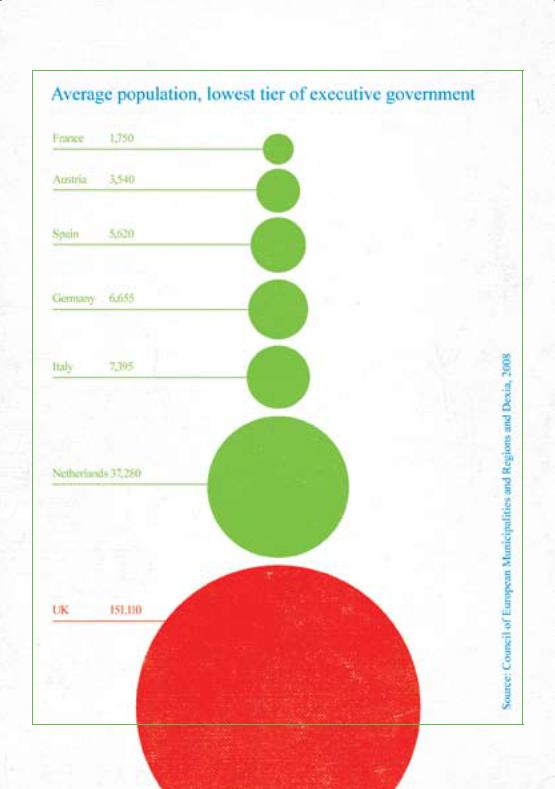
Программа Консерваторов
.pdf
change politics | make politics more transparent
•require senior civil servants to publish online details of expense claims and meetings with lobbyists;
•apply these transparency principles to local government, with the threshold for publication of spending items and contracts
set at £500, and for the publication of salaries the same as at the national level; and,
•give councillors the power to vote on large salary packages for unelected council officials.
Curtail the quango state
Under Labour, the quango state has flourished. Government figures show that there are over
700 unelected bodies spending £46 billion every year, but this does not even include the range of advisory bodies, public corporations, taskforces and regional government bodies that have sprung up under Labour. We believe that Ministers should be responsible for government policy, not unelected bureaucrats. Any quangos that do not perform a technical function or a function that requires political impartiality,
or act independently to establish facts, will be abolished. To increase the scrutiny of quangos, we will:
•give Select Committees the right to hold confirmation hearings for major public appointments, including the heads
of quangos;
•examine the case for giving Select
Committees the power to prevent increases in quango budgets; and,
•ensure that the National Audit Office has full access to the BBC’s accounts.
Reduce the cost of procurement
This government has a dreadful record of managing procurement, with billions of pounds wasted on mismanaged projects. We will tackle wasteful government procurement projects by:
•strengthening the role of the Chief
Information Officer to get a grip on government ICT projects;
•introducing a series of changes to ICT procurement to deliver better value for money;
•appointing senior private sector nonexecutives to departmental boards to deliver better value for money;
•publishing in full government contracts for goods and services worth over £25,000; and,
•increasing the accountability of EU spending by publishing details of every UK project that receives over £25,000 of EU funds.
70

71

72

change politics | make politics more local
Make politics more local
We will put neighbourhoods in charge of planning the way their communities develop, with incentives in favour of sustainable development. We will make it easier for everyone to get onto the housing ladder. We will give individuals and local government much more power, allow communities to take control of vital services, and give people the chance to have a powerful, elected mayor in England’s largest cities.
Over the last forty years, governments of all colours have been guilty of weakening local government. But what was a gradual centralisation has accelerated dramatically under Labour. Bureaucratic control has replaced democratic accountability. The wishes of local people are second-guessed by bureaucrats; the activities of councils are micro-managed by unelected quangos. This hoarding of power by distant politicians and unaccountable officials in Whitehall has damaged society by eroding trust.
We believe that the more responsibility you give people, the more responsibly they behave. That is why we are so determined to give people much more power and control over their lives. Citizens themselves should have a direct say over how they are governed – but not through bureaucratic consultations or phoney citizens juries, which never change anything. We need a totally different approach to governing, one that involves people in making the decisions that affect them. This is what we call collaborative democracy – people
taking the kind of powers that until now have been exercised only by governments. So
we want to pass power down to people – to individuals where we can. But it is not always possible to give power to individuals, and in those cases we need to push power down to the most appropriate local level: neighbourhood, community and local government.
Put communities in charge of planning
The planning system is vital for a strong economy, for an attractive and sustainable environment, and for a successful democracy. A Conservative government will introduce a new ‘open source’ planning system. This will mean that people in each neighbourhood will be able to specify what kind of development they want to see in their area. These neighbourhood plans will be consolidated into a local plan.
73

change politics | make politics more local
We will abolish the entire bureaucratic and undemocratic tier of regional planning, including the Regional Spatial Strategies and building targets.
Developers will have to pay a tariff to the local authority to compensate the community for loss of amenity and costs of additional infrastructure. The tariff will replace the payments and levies on development that have grown up under Labour. A portion of this tariff will be kept by the neighbourhoods in which a given development takes place, providing clear incentives for communities which go for growth.
Significant local projects, like new housing estates, will have to be designed through a collaborative process that has involved the neighbourhood. Immediate neighbours will have a new role – with a faster approvals process for planning applications where neighbours raise no objections.
At the national level, for all forms of development, we will publish and present to Parliament for debate a simple and consolidated national planning framework, which will set out national economic and environmental priorities.
To give communities greater control over planning, we will:
•abolish the power of planning inspectors to rewrite local plans;
•amend the ‘Use Classes Order’ so that people can use buildings for any purpose allowed in the local plan;
•limit appeals against local planning decisions to cases that involve abuse of process or failure to apply the local plan;
•encourage county councils and unitary authorities to compile infrastructure plans;
•give local planning authorities and other public authorities a duty to co-operate with one another; and,
•allow neighbourhoods to stop the practice of ‘garden grabbing’.
Deliver more affordable homes
We want to create a property-owning democracy where everyone has the chance to own their own home. That is why we will permanently raise the stamp duty threshold to
£250,000 for first-time buyers, meaning nine out of ten of them will pay no tax on their first home purchase.
Communities should benefit when they choose to develop sustainably, so we will match pound-for-pound the council tax receipts that local authorities receive from new homes to encourage sensitive local development. We will create new local housing trusts to allow communities to grant planning permission for new housing within villages and towns
74

change politics | make politics more local
– so that the benefits of development remain within the local area. We will also abolish Home Information Packs, which have made a significant contribution to problems in our housing market.
A Conservative government will make it easier for social tenants to own or part-own their home. We will:
•introduce a ‘foot on the ladder’ programme to offer an equity stake to good social tenants, which can be cashed in when they move out of social rented accommodation;
•pilot a new ‘right to move’ scheme and introduce a nationwide social home swap programme, so social tenants can transfer their tenancy to another home or part of the country; and,
•respect the tenures and rents of social housing tenants.
We will implement a range of measures to address the problems of the homeless, including introducing more accurate street
counts and ensuring a Minister in each relevant department has homelessness in their brief.
Give people more power and control over their lives
We have set out our plans to give more power to people over the way they are policed, the schools their children go to and the hospitals
they are treated in. But, in addition, we want to give individuals more direct control over how they are governed. So, mirroring our reforms at the national level, we will give residents the power to instigate local referendums on any local issue if 5 per cent of the local population sign up, and they will also be able to veto any proposed high council tax increases. We will stop Labour’s plans to impose supplementary business rates on firms if a majority do not give their consent.
Nothing underlines the powerlessness that many communities feel more than the loss of essential services, like post offices and pubs, because of decisions made by distant bureaucrats. Our new ‘community right to buy’ scheme will give local people the power to protect any community assets that are threatened with closure. In addition, we will:
•give people a ‘right to bid’ to run any community service instead of the state; and,
•reform the governance arrangements in football to enable co-operative ownership models to be established by supporters.
We will give democratically accountable local government much greater power to improve their citizens’ lives by:
•giving local councils a ‘general power of competence’, so that they have explicit authority to do what is necessary to improve their communities;
75

change politics | make politics more local
•ending ring-fencing so that funding can be spent on local priorities;
•scrapping the hundreds of process targets Labour have imposed on councils;
•ending the bureaucratic inspection regime that stops councils focusing on residents’ main concerns;
•scrapping Labour’s uncompleted plans to impose unwieldy and expensive unitary councils and to force the regionalisation of the fire service;
•ending the ‘predetermination rules’ that prevent councillors speaking up about issues that they have campaigned on; and,
•encouraging the greater use of ward budgets for councillors.
We have seen that a single municipal leader can inject dynamism and ambition into their communities. So, initially, we will give the citizens in each of England’s twelve largest cities the chance of having an elected mayor. Big decisions should be made by those who are democratically accountable, not by remote and costly quangos. We will abolish the
Government Office for London as part of our plan to devolve more power downwards to the London Boroughs and the Mayor of London.
Decentralising control must go hand in hand with creating much greater transparency in
local government. Power without information is not enough. We will implement fully
the Sustainable Communities Act, and reintroduce the Sustainable Communities Act
(Amendment) Bill as government legislation, to give people greater information on, and control over, what is being spent by each government agency in their area.
Our plans to decentralise power will only work properly if there is a strong, independent and vibrant local media to hold local authorities to account. We will sweep away the rules that stop local newspapers owning other local media platforms and create a new network
of local television stations. And we will tighten the rules on taxpayer-funded publicity spending by town halls.
76

77

78

change politics | restore our civil liberties
Restore our civil liberties
We will scale back Labour’s database state and protect the privacy of the public’s information. We will introduce a balanced approach to the retention of people’s DNA and reform the criminal records system so it protects children without destroying trust.
Labour have subjected Britain’s historic freedoms to unprecedented attack. They have trampled on liberties and, in their place,
compiled huge databases to track the activities of millions of perfectly innocent people, giving public bodies extraordinary powers to intervene in the way we live our lives.
The impact of this has been profound and farreaching. Trust has been replaced by suspicion. The database state is a poor substitute for the human judgement essential to the delivery of public services. Worse than that, it gives people false comfort that an infallible central state is looking after their best interests. But the many scandals of lost data, leaked documents and database failures have put millions at risk. It is time for a new approach to protecting our liberty.
Protect our freedoms
Labour’s approach to our personal privacy is the worst of all worlds – intrusive, ineffective and enormously expensive. We will scrap ID cards, the National Identity Register and the Contactpoint database. To protect our freedoms from state encroachment and encourage greater social responsibility, we will replace the
Human Rights Act with a UK Bill of Rights.
We will review and reform libel laws to protect freedom of speech, reduce costs and discourage libel tourism.
Wherever possible, we believe that personal data should be controlled by individual citizens themselves. We will strengthen the powers
of the Information Commissioner to penalise any public body found guilty of mismanaging data. We will take further steps to protect people from unwarranted intrusion by the state, including:
•cutting back intrusive powers of entry into homes, which have been massively extended under Labour;
•curtailing the surveillance powers that allow some councils to use anti-terrorism laws to spy on people making trivial mistakes or minor breaches of the rules;
•requiring Privacy Impact Assessments of any proposal that involves data collection or sharing; and,
•ensuring proper Parliamentary scrutiny of any new powers of data-sharing.
79
